Commentary on Numbers 7:43
Numbers 7:43 states, "And his offering was one silver charger, the weight whereof was an hundred and thirty shekels, one silver bowl of seventy shekels, after the shekel of the sanctuary; both of them were full of fine flour mingled with oil for a meat offering." This verse appears in the context of the offerings brought by the leaders of Israel during the dedication of the altar.
Introduction
The offerings mentioned in Numbers 7 signify not only the leaders' devotion to God but also represent their roles within the community of Israel. Each item listed in their offerings has symbolic significance, reflecting the spiritual truths and practices of worship during this pivotal period. In this analysis, we will draw insights from respected public domain commentaries to understand the depth of these offerings.
Contextual Analysis
In the preceding chapters, God instructed Moses about the organization of the Israelites as they camped and traveled through the wilderness. The culmination of these commands leads to the establishment of the sacrificial system, with unique offerings for specific occasions.
The Nature of Offerings
Albert Barnes emphasizes that the offerings being presented were not just physical gifts; they represented the heart and commitment of the offerors. These gifts were meant to express gratitude, devotion, and acknowledgement of God’s providence and holiness.
The Significance of the Measurements
According to Adam Clarke, the specific weights assigned, such as "an hundred and thirty shekels" for the silver charger, emphasize the importance of the offerings and the community's adherence to the divine standards laid out in the Law. The measurements serve as a tangible rite of worship and submission to God's commandments.
The Silver Charger and Bowl
The silver charger and bowl used in the ritual offerings also have greater significance when considered metaphorically. Matthew Henry points out that silver often represents redemption in Scripture. Thus, the use of silver chargers and bowls may symbolize the redemptive work of God among His people. Silver’s purity and value reflect the quality of dedication the leaders presented to God.
Flour and Oil in Offerings
The fine flour mingled with oil for a meat offering represents the best of human effort combined with the anointing and blessing of God. Clarke notes that flour often symbolizes life and sustenance, while oil represents the Holy Spirit and divine blessing. Together, they illustrate the partnership between human action and divine grace.
The Role of Leadership in Worship
The leaders’ participation and offerings illustrate a principle that leaders in the faith community must set an example of worship and service. As expressed by Barnes, this highlights that the leaders were not merely present for duty but actively involved in spiritual practices that engage the entire community.
Lessons for Pastors and Leaders
- The Importance of Exemplary Leadership: Leaders are called to model faithfulness and devotion in their worship.
- Engaging the Community: Offerings should represent not only personal devotion but also inspire the congregation to participate in communal worship.
- Understanding Symbolism: Recognizing the deeper meanings behind rituals and offerings aids in teaching and engaging others in the faith.
Theological Implications
These verses also bear theological significance concerning the nature of God's covenant. The offerings represent the voluntary response of God’s people to His covenant relationship. As stated in Matthews Henry's commentary, despite the grandiosity of Israel’s offerings, they pale in comparison to the greater offering that God would provide through Christ, wherein the true fulfillment of the sacrificial system is found.
Christ as the Ultimate Offering
Similarly, the fine flour and oil offerings lead us to Christ, who fulfills the need for sustenance and anointing. This typological interpretation encourages believers to see the consistent thread of God’s redemptive plan throughout Scripture.
Application for Today’s Church
The principle of offering and sacrifice is still highly relevant. The reflection in Numbers 7:43 challenges contemporary believers to consider what they are willing to offer to God, both materially and spiritually. Just as the leaders of Israel brought their best, modern Christians are called to bring their first fruits, whether in service, time, or resources.
Practical Considerations
- Dedication of Resources: Church leaders and congregants should assess their commitment to God and how their resources are utilized for His Kingdom.
- Rituals of Community: How do we as a church actively engage in sacrificial living that models the love of Christ to the world?
- Introspection and Repentance: Encourage community reflection on personal offerings to God and dedication to serving others.
Conclusion
Numbers 7:43, while a verse primarily detailing the offerings of the leaders, holds a wealth of spiritual and theological insights. Through examination of historical context, the symbolic meaning of the offerings, and their applicability today, we see that the heart of worship is both personal and communal. This passage calls modern Christians to reflect on the quality of their offerings to God while encouraging faithful leaders to set a robust example for their congregations.


